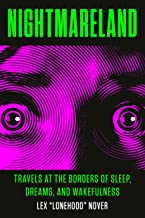Nightmare Disorder
Nightmare disorder, also known as dream anxiety disorder, is a sleep disorder characterized by frequent nightmares. The nightmares, which often portray the individual in a situation that jeopardizes their life or personal safety, usually occur during the REM stages of sleep.
Cluster Number:
Wiki Number: PW136
Diagnosis: Nightmare Disorder
US Patients: 4% of adults; 1% of children
World Patients:
Sex Ratio: M;W2
Age Onset:
Brain Area:
Symptoms: frequent nightmares involving personal safety, usually occurring during REM stages of sleep; remembers every detail of the dream
Progression: does not wake up screaming, but reduce daytime efficiencies from being “tired”; fear and physical aggression are the most common
Causes: PTSD, extreme stress, death of a loved one; 30% have other psychiatric illnesses
Medications: several antipsychotic medicines have reduced nightmares; hypnosis and relaxation may also help
Therapies: EMDR (Eye Movement Desensitization and Reprocessing) have helped portions of those with PTSD or other threatening experiences.
Youtube Video: Nightmares and Treatment
Amazon or Library Book: Nightmareland
Click the book to link or buy from Amazon.

